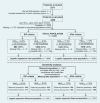Blood glucose control and quality of health care in non-insulin-treated patients with Type 2 diabetes in Spain: a retrospective and cross-sectional observational study
- PMID: 21294772
- PMCID: PMC3123709
- DOI: 10.1111/j.1464-5491.2011.03258.x
Blood glucose control and quality of health care in non-insulin-treated patients with Type 2 diabetes in Spain: a retrospective and cross-sectional observational study
Abstract
Aims: To assess blood glucose control and quality of health care provided to non-insulin-treated patients with Type 2 diabetes mellitus in routine clinical practice in Spain.
Methods: In this observational, retrospective, cross-sectional study, patients were grouped as either having good or suboptimal blood glucose control according to International Diabetes Federation or American Diabetes Association HbA(1c) goals. Clinical and socio-demographic data and compliance with the main standard level of care recommendations of the International Diabetes Federation were recorded during a routine visit. Correlates of glucose control were analysed by logistic regression.
Results: Many patients were grouped as having suboptimal control under International Diabetes Federation (61.9%) or American Diabetes Association (45.0%) criteria. The mean number of accomplished International Diabetes Federation recommendations (7.3 out of 11) was higher for endocrinologists (than for internists or primary care physicians), and significantly more patients under their care were in the good glucose control group (than with primary care physicians). More recommendations were associated with blood glucose control using International Diabetes Federation than American Diabetes Association criteria, demanding higher quality of health care for achieving stricter goals. Some recommendations were poorly observed, particularly those concerning patients' education on diabetes, the prompt prescription of effective treatments and monitoring of complications. Diabetes complications were associated with being in the suboptimal control group. Patients' education on diabetes and HbA(1c) monitoring were associated with being in the good control group.
Conclusions: These results demonstrate the need for improvement in the management of patients with non-insulin-treated Type 2 diabetes in actual clinical practice in Spain. Such improvement would entail a stricter adherence to International Diabetes Federation recommendations.
© 2011 Eli Lilly and Company. Diabetic Medicine © 2011 Diabetes UK.
Figures



References
-
- IDF. Diabetes Atlas. 4th edn. Brussels: International Diabetes Federation; 2009. - PubMed
-
- IDF Clinical Guidelines Task Force. Global Guideline for Type 2 Diabetes. Brussels: International Diabetes Federation; 2005.
-
- NICE. Type 2 Diabetes. The Management of Type 2 Diabetes. London: National Institute for Health and Clinical Excellence; 2008. NICE clinical guideline 66.
-
- Gray A, Raikou M, McGuire A, Fenn P, Stevens R, Cull C, et al. Cost-effectiveness of an intensive blood glucose control policy in patients with type 2 diabetes: economic analysis alongside randomised controlled trial (UKPDS 41). UK Prospective Diabetes Study Group. Br Med J. 2000;320:1373–1378. - PMC - PubMed
Publication types
MeSH terms
Substances
LinkOut - more resources
Full Text Sources
Medical
Miscellaneous

